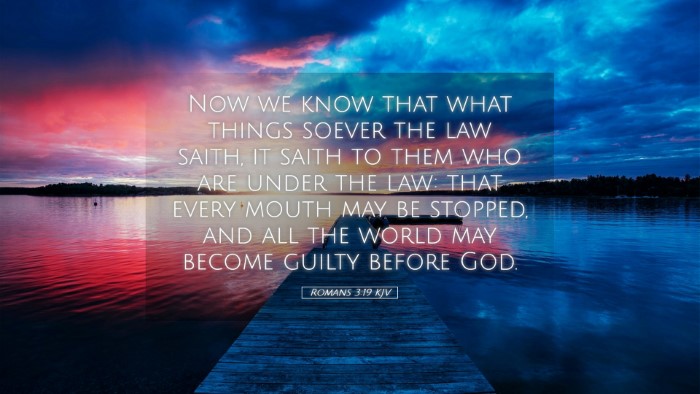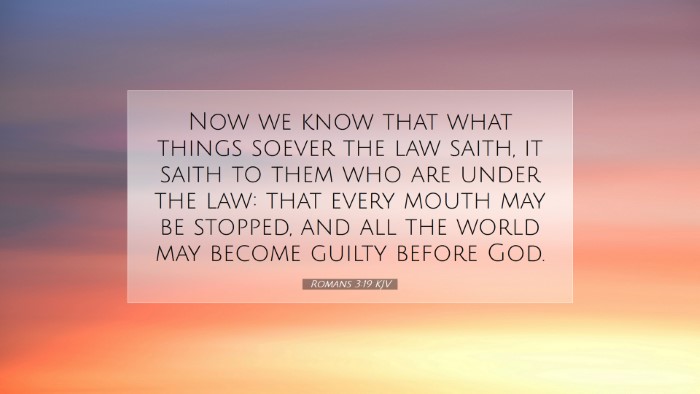Commentary on Romans 3:19
Text of Romans 3:19 (ESV): "Now we know that whatever the law says it speaks to those who are under the law, so that every mouth may be stopped, and the whole world may be held accountable to God."
Introduction
Romans 3:19 is a pivotal verse in the epistle that reflects the Apostle Paul's theological arguments concerning the universal need for salvation. It emphasizes the role of the law in revealing human sinfulness and accountability to God. This commentary presents insights from several public domain biblical commentators, providing a multifaceted understanding for pastors, theologians, and students of Scripture.
The Role of the Law
Matthew Henry's Perspective:
Matthew Henry emphasizes that the law was given not merely to be a guideline for conduct, but to expose the guilt of humanity. Paul underscores that the law speaks primarily to those who fall under its jurisdiction. The emphasis here is that the law serves as a mirror reflecting human weakness and sin. Henry posits that the law brings people to a standstill—"every mouth may be stopped"—indicating that it silences all arguments and excuses before the divine judgement.
Albert Barnes' Insights:
Albert Barnes notes that the law speaks to those "under the law," which includes both Jews and Gentiles who are aware of moral standards. He asserts that the law's purpose is to bring accountability before God. Barnes articulates that the phrase "the whole world may be held accountable" underscores the universality of sin, reinforcing that all are equally subjected to divine scrutiny. This implies that legalism cannot offer justification but rather reveals the need for grace.
Implications of Accountability
As the verse articulates, the law’s role is not to redeem but to reveal. This conveys a profound theological reality: all humans are accountable to God regardless of their status or covenant relationship.
Adam Clarke's Analysis:
Clarke expands on the notion of accountability to God, suggesting that this divine examination results in the recognition of humanity's inability to attain righteousness through their own efforts. He argues that the law acts as a divine measurement that inevitably results in the conclusion of human failure. Clarke warns against the misconception that one can be justified by mere adherence to the law; rather, the law's function is to lead individuals to Christ, the ultimate source of grace.
Theological Reflections
- The Universality of Sin: The verse encapsulates the concept that all human beings are under the curse of sin, necessitating salvation.
- The Law's Purpose: The law serves as a diagnostic tool—revealing sin but not providing the remedy.
- Human Accountability: Each individual is accountable to God, reinforcing the need for a personal relationship with the divine.
Practical Applications
For pastors and teachers, Romans 3:19 serves as a pivotal point to address the deep-seated issues of sin and the necessity of grace. It encourages Christians to confront their shortcomings honestly and to recognize the role of the law in their spiritual lives.
- Teaching About Sin: Use this verse to explain the concept of sin as universally applicable to all mankind, which sets the stage for the presentation of the Gospel.
- Encouraging Humility: Remind believers of their need for Christ; understanding that the law silences every boast leads to humility before God.
- Discipleship Opportunities: Create small group discussions around the implications of the law and the grace found in Christ.
Conclusion
Romans 3:19 invites readers to reassess their understanding of the law's function. As illustrated by Henry, Barnes, and Clarke, the law is essential for understanding one's sinfulness and God's righteous requirement. Ultimately, it drives us toward the grace found in Jesus Christ, where true justification lies. For theologians and students, this verse serves as a crucial reminder of humanity's need for salvation—from both a legal and relational perspective. As we grapple with its implications, may we continually reflect on the grace that satisfies the law's demands.


